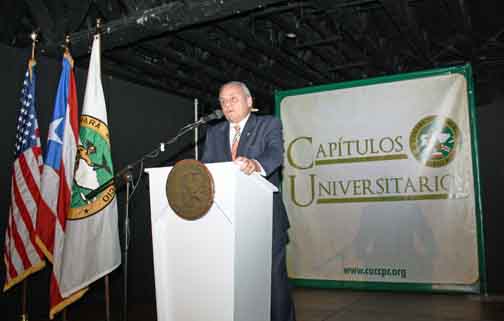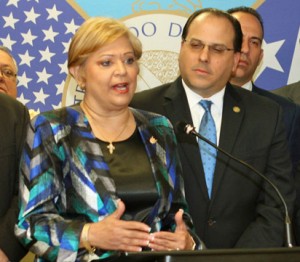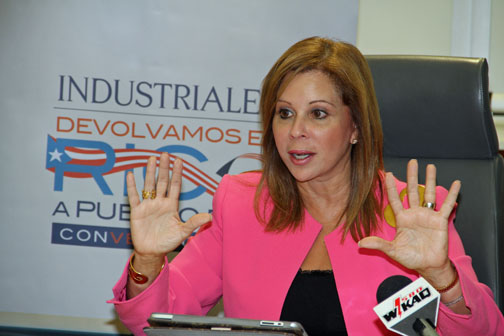Puerto Rican trade groups balk at proposed IVU exemptions

Criticism to the bill proposing amendments to Puerto Rico’s sales and use tax code poured in Thursday from many of the island’s most prominent professional organizations, which essentially agreed that eliminating certain exemptions would have a “devastating” effect on businesses and consumers.
The sales and use tax, known as IVU for its initials in Spanish, is set to undergo changes proposed by the Treasury Department to close loopholes and shore up new revenue to balance the government’s budget.
Puerto Rico Chamber of Commerce President Pablo Figueroa said Thursday that while “everybody is aware that Puerto Rico is facing an extremely precarious financial situation, the Chamber believes that merely increasing taxes to all sectors is not the right solution.”
“On many occasions, the Chamber has recommended that the best way to improve the island’s fiscal situation is through investment in human resources and technology to improve the IVU uptake and attack tax evasion,” he said.
One of the biggest concerns for the Chamber and other trade groups is the elimination of tax exemptions granted in business-to-business services, which like the Society of CPAs said Wednesday, would “lead to a substantial increase in operating expenses of all businesses operating in Puerto Rico.”
“This increase is one that many small and medium businesses can not afford right now, since they have already been affected by increases in operating expenses, including, among others, energy expenses,” Figueroa said. “Even in the case of a business that can afford them, there’s no doubt that this increase in costs would have a cascading effect on prices, resulting in increased prices for consumers already burdened by other cost of living increases.”
This cascading effect is what the IVU sought to avoid when it was implemented to replace the former 6.6 percent general excise tax, Figueroa noted.
‘Don’t burden those who already contribute’
Opposition to the proposals contained in House Bill 1073 also came from the United Retailers Association, which spoke out Thursday on behalf of the island’s small and mid sized businesses.
“If the problem with collections is evasion, then the solution is to improve the uptake system, not further burden those who already contribute,” said Enid Monge-Pastrana, president of the trade group known as CUD for its initials in Spanish.
She added that although the law seeks to expand the collections base, it would instead effectively represent an additional burden on small and mid sized businesses that already collect the IVU.
“The new areas they want to add will make operating more expensive,” Monge-Pastrana said. “It affects us in the products we buy, as well as the services for which we pay: telephone service, professional services and rental of commercial property. Indeed, most small businesses lease their locations and will be affected by this new burden.”
The elimination of the exemption for designated and “B2B” services can spike operating costs mainly because most of the exemptions have no direct impact on consumers. If the imposition occurs early in the transaction chain, the tax can have an inflationary effect. If taxes are applied on goods, it will have the effect of increasing the price of goods and services that are sold on the island.
She said businesses unable to absorb the added financial burdens could turn to operating in the “informal economy.”
‘Serious threat’
Meanwhile, the Puerto Rico Products Association warned that the proposed amendments constitute “a serious threat” to producers of local goods and services. They will be most affected since many of them are based on B2B transactions, either at an intermediate point before reaching the consumer, or at the end of the chain.
“The elimination of the exemption for B2B purchases is a strong blow to Puerto Rican businesses, particularly small and mid sized operations that won’t have a choice but to transfer it to the consumer,” said PRPA President Manuel Cidre. “If you hit the finances of their daily operation it’s useless to be able to claim it later, as you’ve had to fund it out of your pocket every day.”
Cidre said the move could also increase the price of local products, and that goes against the government’s policy of substituting imports with local production.
“Far from fostering a stimulating environment to develop the manufacture of purely Puerto Rican goods and services, a blow is being dealt against its development,” Cidre said. “We know that the government urgently needs to raise revenue, but we believe it needs to strengthen uptake before considering imposing new taxes.”
The impact of the proposed measures seek to collect IVU on several areas that are exempt, such as legal services, leases of real and personal property, and advertising, among others. This will affect all companies that require services that will have to pay more and will have less room to negotiate volume discounts. The impact will be an increase in operating costs of all firms and thus on final consumer prices, Cidre said.
“The imposition of new taxes and burdens on the island’s productive sector will make it harder for the economic recovery and job creation that the government wants to promote,” Cidre said. “Moreover, if the productive sector is weakened, it will limit its ability to pay taxes. The imposition of new costs must be focused and prudent, so as not to worsen the plight of local businesses.”
The three professional groups have the support of the Puerto Rico Private Sector Coalition, which also groups nearly two dozen other local trade organizations, namely the Puerto Rico Manufacturers Association, the Pharmaceutical Industry Association, the Puerto Rico Hotel and Tourism Association, PR2000 and the Society for Human Resource Management.
















